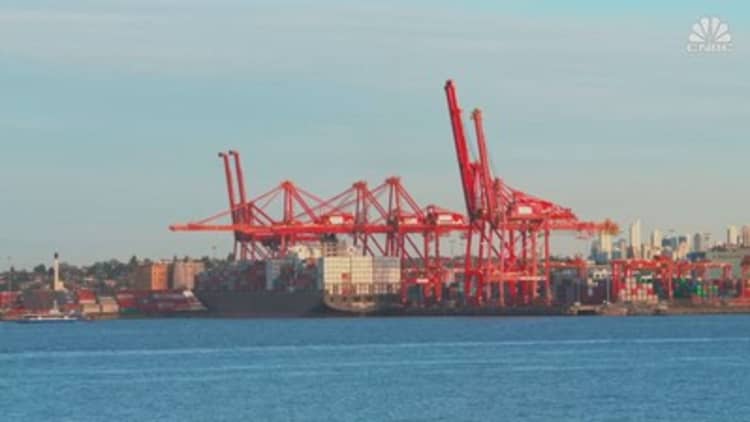$19 billion in trade stranded on water as Canada’s West Coast labor negotiations hit pause
Shipping containers are stacked on a dock at the Port of Vancouver on November 20, 2021.
Justin Sullivan | Getty Images News | Getty Images
After a fourth day of negotiations, the British Columbia Maritime Employers Association told CNBC that negotiations with the International Longshore & Warehouse Union Canada’s Longshore Division are currently paused, pending further discussion with federal mediators.
“The BCMEA remains ready to come back to the table at a moment’s notice, assuming that ILWU Canada is prepared to put forward a reasonable proposal. We are looking to reach a fair and balanced deal so ports can open and goods can start flowing as soon as possible.”
The BCMEA said on Monday that the ILWU Canada “seems to have entrenched their positions,” rather than working for an equitable deal.
Canadian Labor Minister Seamus O’Regan called for both parties to return to the table.
The ILWU said in a statement the BCMEA “has deliberately sabotaged” the progress that was made on contracting out maintenance work.
The ILWU Canada statement said the government gave a 7% increase in minimum wage recognizing the high cost of living.
“One would look at the transportation industry where employers have made their fair share of profits in which their employees were able to share in similar increases in line with what the government has already recognized as reasonable,” it said.
As a result of the strike, Canada’s western ports have not serviced any vessels since June 30. This is creating a backlog in trade with a total of 29 ports on Canada’s West Coast at a standstill.
Included in this labor strife are the ports of Vancouver and Prince Rupert which collectively process and move almost 20% of U.S. trade. Products ranging from critical auto parts like brakes are processed through those ports as well as additional auto and manufacturing parts, holiday items and consumer goods.

Charlotte Cook, senior trade analyst at VesselsValue, told CNBC, “Strike action at the Port of Vancouver and Prince Rupert could have a significant impact on transpacific cargo flows, with the ports typically accepting a combined average of 34 container vessels or 289,700 TEU (container) capacity per month.”
The value of the combined 289,700 containers floating off the ports of Vancouver and Prince Rupert reached $19 billion, based on a $65,225 value per container and Canadian customs data.
Cook warns vessel transit and turnaround times are expected to increase as a result of the strikes and congestion looks to be mounting outside Vancouver, one of Canada’s main container ports.
The delays Cook describes are similar to what logistics managers and shippers experienced during Covid. Delays create congestion which slows down the processing of trade and late fees, which are paid by shippers and typically passed on to consumers.
This strike began on Saturday and also impacts the railroads which serve these closed ports. Three Class 1 railways operate at these ports: CN, Canadian Pacific, and BNSF, a subsidiary of Berkshire Hathaway.
Logistics companies like ITS Logistics are moving additional trucking capacity to the railroad terminals of Chicago and Detroit to move out any containers ahead of the surge of containers that will follow once a deal is agreed upon and vessels can be unloaded.
ILWU Canada said they hoped the BCMEA was not “hiding” behind the threat of “back to work legislation” so they would not have to negotiate.
When CNBC asked about the calls for government intervention, the labor minister’s office said they are encouraging both sides to negotiate at the table in mediation.
Article Courtesy of CNBC
